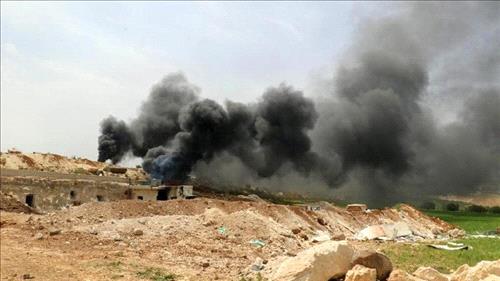Russia says has stopped bombing proposed Syria safe zones
06-05-2017 09:24 AM
Ammon News - AMMONNEWS - Russia on Friday said it had already stopped bombing in areas of Syria set to be designated safe zones under an agreement it inked with Iran and Turkey.
The three key powerbrokers signed off on a Russian plan Thursday to establish four “de-escalation zones” in rebel-held territory of the war-torn country in a bid to shore up a shaky ceasefire.
Under the pact - which Moscow said comes into force from Saturday - the three sides have a month to define the exact borders of the safe zones where fighting and air strikes should be halted.
Moscow - which is flying an air campaign in support of President Bashar al-Assad - said that in order to ease the deal it has stopped bombing the proposed zones.
“From 00:00 May 1 the use of Russian airforce aviation in areas corresponding to the de-escalation zones was halted,” senior Russian military commander Sergei Rudskoi told a news briefing.
The safety zone initiative is the latest attempt by Moscow to forge an end to the six-year conflict after its military might turned the tide of the conflict in favor of Assad.
Rudskoi outlined the proposed zones in the northwestern Idlib province, the north of central Homs province, Eastern Ghouta near Damascus and an area of the south involving Daraa and Quneitra provinces.
Along the frontiers of the “de-escalation zones” will be “security zones” with checkpoints and observation posts to monitor and secure access run by the three guarantor countries.
Moscow said that it was talking to “Jordan and a number of other countries” to sign up as backers of the initiative.
Russia’s military underlined that it will keep on fighting against the ISIS group and the former Al-Qaeda affiliate previously known as Al-Nusra, including inside the “de-escalation zones”.
Rudskoi said that Syrian government troops freed up after the safety zones come into force will be sent to fight ISIS in central and eastern Syria and along the Euphrates river with Russian air support.
Russia’s military said it wants to restore an agreement with the United States to coordinate air operations over Syria and reduce the risk of aircraft colliding.
Russia suspended the agreement a month ago following a US missile strike on a Syrian air base in response to a deadly chemical gas attack that has been blamed on the Syrian government forces.
Rudskoi told reporters on Friday that Russian officers planned to discuss the restoration of the agreement with their American counterparts soon.
Pentagon: Deal won’t affect ISIS fight
Meanwhile, the Pentagon says the de-escalation agreement will not affect the UC led air campaign against the ISIS group in Syria.
Marine Maj. Adrian J.T. Rankine-Galloway, a Pentagon spokesman, said on Friday that “the coalition will continue to target ISIS wherever they operate to ensure they have no sanctuary.”
Rankine-Galloway noted that the US government is not party to the agreement, which was struck during cease-fire talks in Kazakhstan on Thursday.
The United States was represented at the talks but was not part of the agreement signed by Russia, Iran and Turkey.
The Pentagon spokesman also said that the US continues “to effectively de-conflict coalition operations, however, we are not going to discuss the specifics of how we de-conflict operations in the highly congested and complex battlespace in Syria.”
Syrian Kurdish PYD denounces deal
The Syrian Kurdish PYD party rejected a Russian proposal to de-escalation zones in Syria and views it as “sectarian partition” of the country, a spokesman said on Friday.
Iran and Turkey agreed on Thursday to the Russian plan, but the memorandum was not immediately published, leaving its details unclear.
The zones appear intended to halt conflict in specific areas between Syrian government forces and rebels, and would potentially be policed by foreign troops.
The plan amounts to “dividing Syria up on a sectarian basis,” said Ibrahim Ibrahim, a PYD spokesman, who described it as a “crime”.
Ibrahim said the Russian proposal could also threaten autonomous regions in the Kurdish-dominated north that emerged with the onset of the multi-sided conflict in 2011.
The PYD is the political affiliate of the YPG militia, which effectively serves as the military of the Kurdish-led enclaves and has appeared to be a key partner for the United States in fighting ISIS in Syria.
The dominant Syrian Kurdish groups and their allies aim to deepen their autonomy through establishing a new system of federal government in the north. They say the regional federal model should be the solution to the entire Syrian war.
The countries involved in the de-escalation deal could thwart these plans and encroach on the autonomous regions, Ibrahim said.
*Agencies









 comment replay
comment replay 